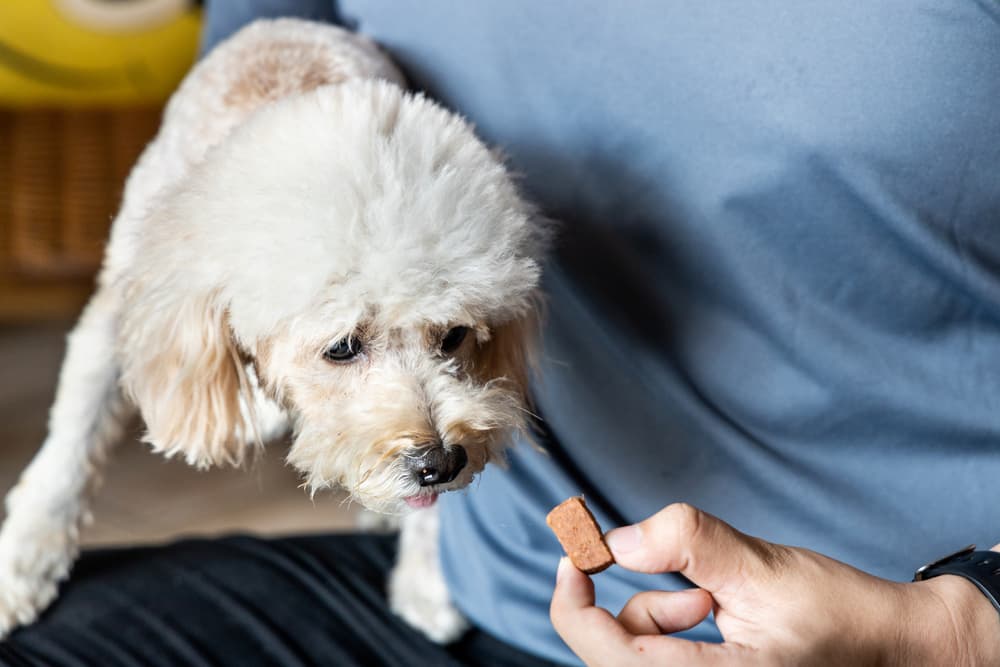Dog Heartworm Treatment Plan: Steps and What to Expect

Overview
Heartworm disease in dogs is an infectious disease caused by a parasitic worm that infects the heart and great vessels. It is carried by mosquitoes and while it is most common in hot and humid areas, it has been diagnosed in all 50 states.
If your dog has been diagnosed with heartworm disease, it may feel overwhelming and scary. You may wonder what a dog’s life expectancy after heartworm treatment is, and you may not know the right course of action to take. Fortunately, your veterinarian is an excellent resource for all of your questions. Read on to learn more about heartworm treatment for dogs and what to expect.
Dog Heartworm Treatment Plan: What to Expect

Dogs usually require treatment for heartworms in the following situations:
- You missed your dog’s heartworm prevention, you live in an area with heartworm disease, and your dog tests positive for heartworms
- You have adopted a dog who tested positive for heartworm disease
- You didn’t know that your dog had heartworm disease until they were tested
The goals of heartworm treatment for dogs are to improve the health of the dog and eliminate all life stages of the parasite from their body. The type of treatment your veterinarian will recommend depends on several things:
- How sick your dog is from heartworm
- If your dog has any other health conditions
- How many worms they are carrying
If your dog is not exhibiting any symptoms of heartworm disease, then treatment is generally straightforward and successful. If your dog is sick from heartworms, then they will need to be stabilized before starting treatment to eliminate heartworms. This may require that they receive intravenous medications, such as steroids, diuretics, blood pressure medication, heart medication, and fluid therapy. Sometimes, dogs are carrying so many worms that they require surgical removal of worms. Treating these patients can be very difficult, which is why heartworm prevention is so important in dogs.
The American Heartworm Society recommends that all dogs undergoing treatment for heartworm disease, whether they are sick or not, are hospitalized while they are receiving and recovering from medication injections to kill worms. This is because it is critical that they stay very quiet while they are receiving medication to eliminate the worms. Overheating, excitement, or exercise during treatment—and for 6-8 weeks after the last medication injection—are the most significant factors contributing to life-threatening heart and lung complications associated with heartworm disease treatment, including death from pulmonary thromboembolism. It is best that a dog go on cage/kennel rest as soon as they are diagnosed with heartworm disease.
In some cases, your veterinarian may elect to pre-treat your dog with medication before starting injections to eliminate the worms. These medications can be given at home (and are covered in more detail in the “Dog Heartworm Medicine” section of this article).
For most dogs, heartworm treatment takes about four months from beginning to end. However, expect some testing to be required after treatment has stopped, and plan to keep your dog on heartworm prevention continually after they are treated.
Dog Heartworm Treatment Cost

Cost of heartworm disease varies, but in general, you can expect the following:
- Initial physical examination and heartworm test: $75-$125
- Confirmation tests: $25-$45
- Additional tests (chest X-rays, chest ultrasound): $250-$1,000
- Pre-treatment medications: $50-$100
- Heartworm prevention to kill heartworm larvae: $20-$60
- Injections to kill adult heartworms: $500-$1,500
- Hospitalization during injections: $20-$40/day
- Follow-up veterinary visits and testing: $100-$150
- Surgery costs: $3,000-$6,000
If your dog is very sick or requires multiple rounds of treatment, the cost goes up.
Heartworm disease in dogs treatment can be costly. Pet insurance, emergency credit lines, savings accounts, and payment plans can all help with the cost of veterinary bills. In addition, if you can afford part of the treatment but not all, talk to your veterinarian—they can offer options that can still help your dog.
Dog Life Expectancy After Heartworm Treatment
Dog life expectancy after heartworm treatment varies. Heartworms cause serious inflammation and damage to the heart and lungs. The longer a dog is infected with heartworms, the more damage occurs. Dog life expectancy after heartworm treatment depends on how much damage was done, how the dog tolerates treatment, and the overall health of the dog.
In general, dogs that are asymptomatic for heartworm disease can live a long, healthy life free of symptoms after treatment. Dogs who are sick with heartworm disease and have symptoms (cough, exercise intolerance, etc.) have a poorer prognosis with treatment. Your veterinarian will be able to best advise you of your dog’s life expectancy after treatment.
Dog Heartworm Medicine

Dogs who are initially diagnosed with heartworms are given several medications to weaken adult worms, kill worm larvae, and reduce side effects associated with killing adult worms.
Doxycycline, an antibiotic, is often given for four weeks prior to administration of melarsomine to kill a bacteria called Wolbachia, which is often present with heartworms. This drug often minimizes side effects associated with melarsomine and kills worm larvae.
If a dog is showing signs of heartworm disease (coughing, etc.), they will also be pre-treated with steroids and other medications before melarsomine injections.
Heartworm prevention medication is often administered for eight weeks before giving melarsomine to kill worm larvae.
Melarsomine is the only drug approved by the FDA to kill adult heartworms. It is administered by an injection into muscle. After each injection, dogs must be kept as quiet as possible while worms die. This equates to six to eight weeks of rest, no exceptions. Most dogs need to be crated or kenneled to stay quiet, and they must be kept on a leash to do their business. If you have guests over, ensure that your dog remains crated in a separate, quiet room to minimize stress and excitement. Remember—this is for your dog’s own good.
Additional medications that may be prescribed include aspirin or heparin to reduce clotting or risk of pulmonary thromboembolism. There is no natural heartworm treatment for dogs.
After treatment, dogs should be given heartworm prevention monthly for the duration of their lifespan. If they have any lingering symptoms associated with inflammation caused by the worms, they will be prescribed medication to manage those.
How to Treat Heartworm in Dogs at Home

Letting a dog who is undergoing treatment for heartworms exercise or get excited is a serious no-no can result in serious adverse side effects. However, it can be challenging to keep dogs quiet. Here are some tips that can help you:
- Keep your dog indoors and in a large kennel/crate most of the time
- Keep your dog on a leash when they urinate/defecate
- Keep on-leash walks very short and slow; allow your dog to sniff for 10 minutes several times a day
- Refrain from having visitors to your home if that makes your dog excited
- Spend lots of time with your dog just hanging out
- Utilize food puzzles and long-lasting chews
- Reduce overall calories by 20 percent to prevent weight gain while confined
- Train your dog to follow quiet commands while crated
- Utilize over-the-counter calming aids
- If you are struggling, talk to your vet and ask them for advice or additional tools
- If your dog had surgery, monitor the surgical site daily for two weeks for any signs of inflammation and infection, such as redness, swelling, discharge, or odor
Heartworm Treatment for Dogs: Tips and Advice
Most dogs will have lower energy while being treated for heartworms. Signs that your dog is experiencing serious side effects of heartworm treatment in dogs and that you need to call a veterinarian immediately include:
- Pale gums
- Coughing
- Extreme lethargy
- Paralysis/dragging legs/can’t get up
- Confusion
- Swelling, redness, or discharge from injection site
Heartworm poses a grave risk to dogs. The longer they remain in a dog’s heart and lungs, the greater the damage to the cardiopulmonary system, the greater the risk of illness and death, and the higher likelihood that heartworms will be spread to other dogs. While heartworm treatment can feel overwhelming, remember you are doing the right thing and giving your dog the best chance at a healthy life by choosing to have them treated.
